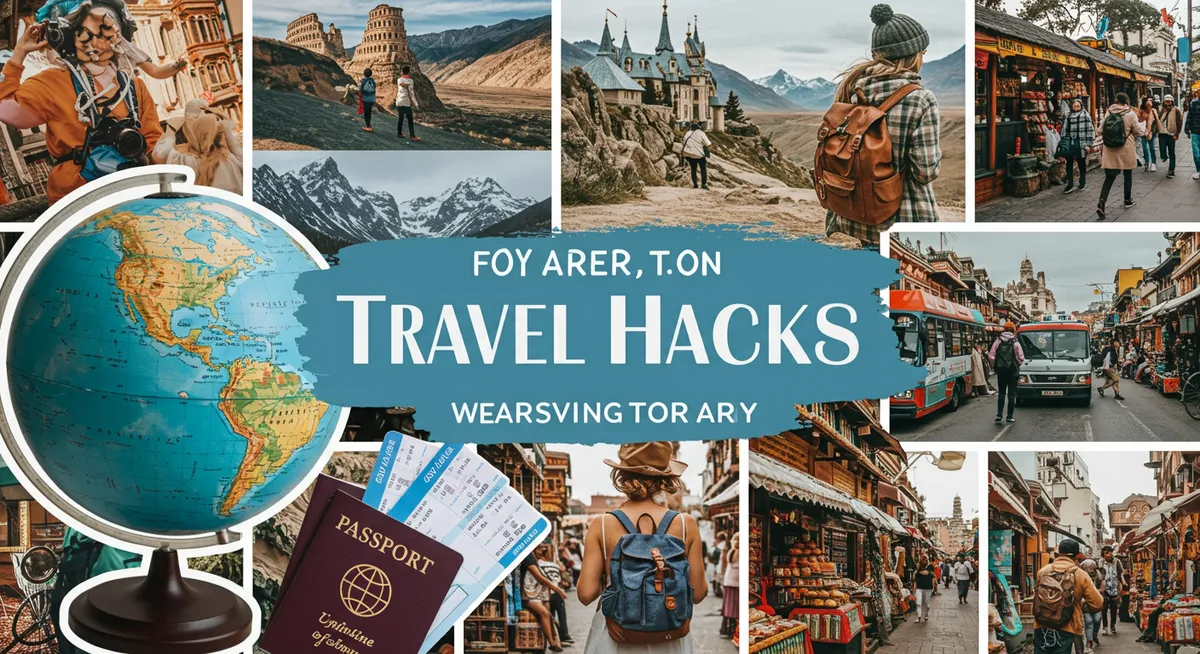
50 Travel Hacks For Perfect Trip
Table of Contents
Want to find the best travel deals for this destination? Chat with our travel hacking specialist!
Get Travel HacksCategory: travel-hacks
50 Essential Travel Hacks For a Perfect Trip
Travel opens our minds to new experiences, cultures, and perspectives, but it can also present challenges that disrupt even the most meticulously planned itineraries. Whether you're a seasoned globetrotter or planning your first adventure, these 50 travel hacks will help you navigate common obstacles, save money, and enhance your overall travel experience. From packing efficiently to navigating foreign destinations like a local, these practical tips and tricks are designed to make your journey smoother and more enjoyable.
Before You Go: Planning and Booking Hacks
Planning is the foundation of a smooth travel experience. These pre-departure travel hacks will help you secure the best deals, prepare necessary documents, and set yourself up for success before you even leave home. For more in-depth advice on this topic, check out our detailed guide on planning and booking travel strategies.
1. Use Incognito Mode for Flight Searches
When searching for flights online, use your browser's incognito or private mode. Travel websites often track your searches and may increase prices based on your browsing history and repeated searches for the same routes. By browsing incognito, you prevent this tracking and potentially secure lower fares.
2. Set Fare Alerts for Price Drops
Don't have time to constantly check for the best flight deals? Set up fare alerts on platforms like Google Flights, Skyscanner, or Kayak. These services will notify you when prices drop for your desired routes, allowing you to book at the optimal time and potentially save hundreds of dollars.
3. Book Flights 6-8 Weeks in Advance
Studies show that booking domestic flights about 6 weeks in advance and international flights 8 weeks ahead often yields the best prices. However, this can vary by destination and season, so combining this approach with fare alerts maximizes your chances of scoring a deal.
4. Fly Mid-Week for Lower Fares
Tuesday and Wednesday are typically the cheapest days to fly, while weekends tend to be more expensive. If your schedule allows flexibility, adjusting your travel dates by even a day or two can result in significant savings. Most booking platforms offer a "flexible dates" option to easily compare prices across different days.
5. Book Accommodations with Free Cancellation
When possible, book accommodations that offer free cancellation policies. This gives you the flexibility to change plans if needed and take advantage of better deals that might emerge closer to your travel date. Just be sure to set a reminder to cancel within the allowed timeframe if you find a better option.
Pro Tip: Create a dedicated email address for travel bookings to keep all your confirmations, itineraries, and travel deals organized in one place, away from your regular inbox clutter.
6. Consider Alternative Accommodations
Look beyond traditional hotels to options like vacation rentals, hostels with private rooms, or homestays. These alternatives often provide more space, kitchen facilities, and authentic local experiences at lower costs. Platforms like Airbnb, VRBO, and Homestay connect travelers with unique lodging options worldwide.
7. Use a VPN to Find Better Deals
Prices for flights, accommodations, and car rentals can vary based on your geographical location. Using a Virtual Private Network (VPN) allows you to appear as if you're browsing from different countries, potentially uncovering better deals that would otherwise be unavailable in your region.
8. Download Essential Apps Before Departure
Before traveling, download apps that will be useful at your destination: maps that work offline, language translators, currency converters, and local transportation apps. This preparation ensures you'll have the tools you need even without internet access and avoids the hassle of downloading apps using unreliable Wi-Fi or expensive data roaming.
9. Notify Your Bank and Credit Card Companies
Prevent your cards from being frozen due to "suspicious" foreign transactions by notifying your bank and credit card companies about your travel plans. Many institutions allow you to set travel notices online or through their apps, specifying your destinations and travel dates.
10. Make Digital and Physical Copies of Important Documents
Scan or photograph your passport, visa, driver's license, travel insurance policy, and other essential documents. Store these digital copies securely in cloud storage and share them with a trusted contact. Additionally, keep a physical photocopy separate from the originals in case of loss or theft.
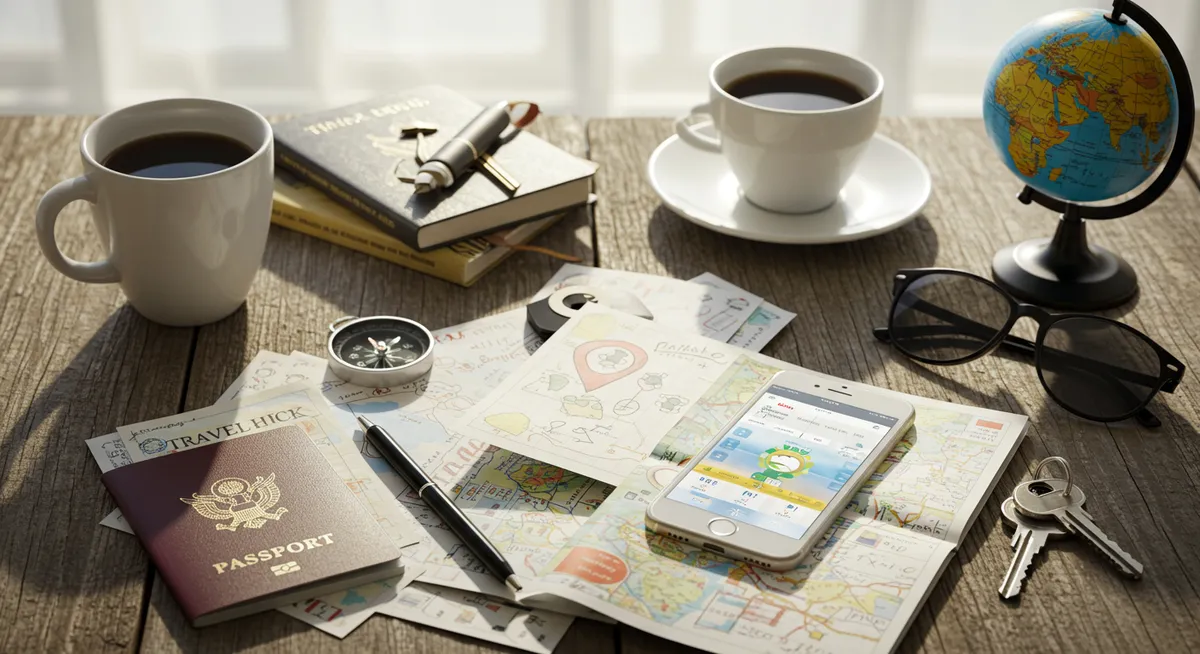
Packing Hacks: Maximize Space and Minimize Stress
Strategic packing can transform your travel experience, preventing excess baggage fees and making it easier to manage your belongings on the go. These packing hacks will help you travel lighter while ensuring you have everything you need. For more comprehensive packing strategies, explore our full guide on smart packing techniques.
11. Roll Clothes Instead of Folding
Rolling your clothes instead of folding them not only saves significant space in your luggage but also helps prevent deep wrinkles. For even more efficiency, use the "ranger roll" technique, which involves folding the bottom portion of the garment over the rolled portion to create a compact, secure bundle.
12. Use Packing Cubes for Organization
Packing cubes are fabric containers that revolutionize luggage organization. Group similar items in separate cubes—one for tops, another for bottoms, and so on. This system makes it easy to find specific items without unpacking everything and helps compress clothing to create more space.
13. Pack Clothing That Serves Multiple Purposes
Choose versatile pieces that can be worn multiple ways and in different combinations. A simple dress that can be dressed up or down, pants that convert to shorts, or a scarf that doubles as a beach cover-up, blanket, or impromptu bag are excellent examples of multi-purpose travel clothing.
14. Stuff Shoes with Small Items
The interior of shoes provides valuable storage space for socks, underwear, chargers, or toiletry bottles. This hack not only maximizes luggage space but also helps shoes maintain their shape during transit. Place items in small bags or socks before stuffing them into shoes to keep everything clean.
15. Wear Your Bulkiest Items While Traveling
Save valuable luggage space by wearing your heaviest or bulkiest items during transit. This might include wearing your hiking boots instead of packing them, layering with your jacket or sweater, and keeping your hat on your head rather than crushing it in your bag.
Pro Tip: When packing toiletries, place a small piece of plastic wrap under the caps before screwing them back on to prevent leakage due to pressure changes during flights.
16. Pack a Pillowcase for Versatile Use
A pillowcase takes up minimal space but serves multiple functions: use it as a laundry bag, a makeshift pillow (stuffed with clothes), a beach bag, a way to protect delicate items, or actually cover a questionable pillow at your accommodation. Opt for a quick-drying microfiber version for even more versatility.
17. Bring a Lightweight Power Strip
Many hotel rooms and hostels have limited outlets. A compact power strip with USB ports allows you to charge multiple devices simultaneously with just one international adapter. This essential tool prevents the frustration of choosing which devices to charge first when outlet access is restricted.
18. Use a Binder Clip to Protect Razor Blades
Keep your razor blade sharp and prevent it from nicking other items in your toiletry bag by securing a binder clip over the head. This simple hack also extends the life of your razor by protecting it from moisture and damage when packed.
19. Create a Capsule Wardrobe with a Consistent Color Scheme
Build your travel wardrobe around a limited color palette where everything coordinates with everything else. This approach drastically reduces the number of items you need to pack while maximizing the number of different outfits you can create, giving you flexibility without the bulk.
20. Pack a Reusable Water Bottle with Built-in Filter
A water bottle with an integrated filter allows you to safely drink tap water in most locations, saving money on bottled water and reducing plastic waste. Many lightweight, collapsible options are available that take up minimal space when not in use but provide significant convenience during your travels.
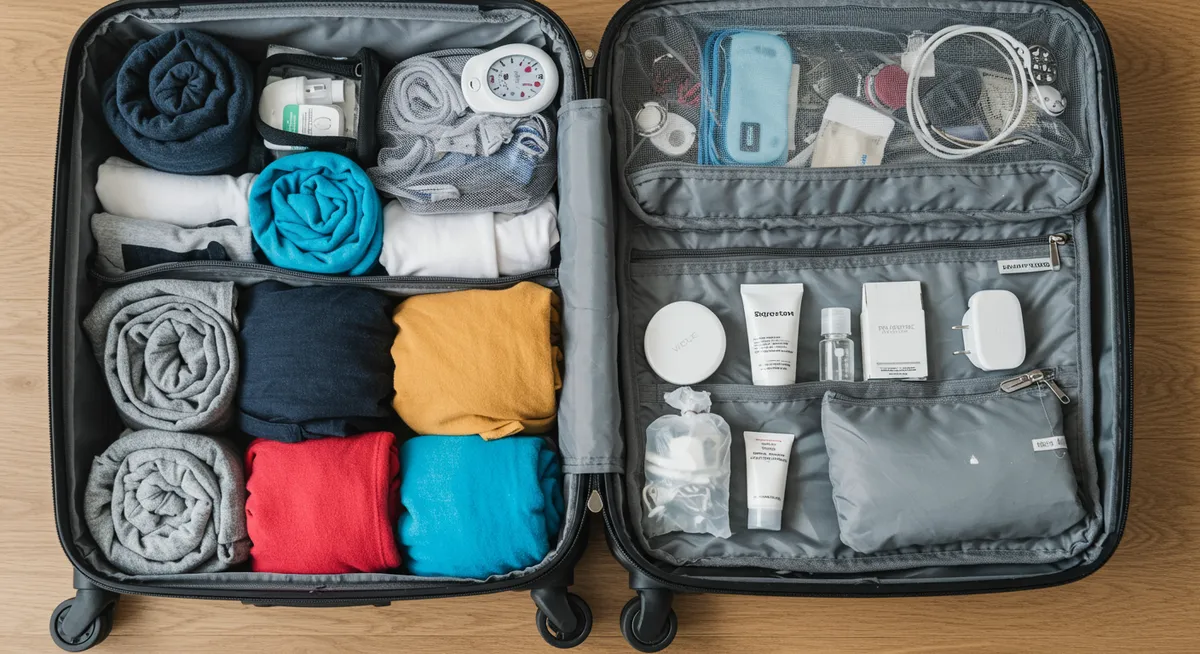
Money-Saving Travel Hacks
Travel doesn't have to break the bank. These savvy money-saving hacks will help you stretch your budget further without compromising on experiences, allowing you to travel longer or more luxuriously within your means. Learn even more ways to save money while traveling in our dedicated guide to budget-friendly travel strategies.
21. Use a No-Foreign-Transaction-Fee Credit Card
Standard credit cards often charge 2-3% on every purchase made abroad. By using a credit card specifically designed for international travel with no foreign transaction fees, you'll save on these hidden charges that can quickly accumulate during your trip. Many of these cards also offer travel rewards points or miles.
22. Withdraw Local Currency from ATMs Instead of Exchange Offices
Currency exchange offices, especially those in airports and tourist areas, typically offer poor exchange rates and charge high fees. Instead, withdraw cash directly from local ATMs using a debit card with low international fees. You'll generally receive a more favorable exchange rate and pay lower overall fees.
23. Eat Where the Locals Eat
Venture away from tourist hotspots to find authentic local eateries where prices are typically lower and food quality is often higher. A good rule of thumb: look for restaurants full of locals, especially those that are a few blocks away from major attractions. Not only will you save money, but you'll also enjoy more authentic culinary experiences.
24. Take Advantage of Free Walking Tours
Many cities worldwide offer free walking tours led by knowledgeable local guides. These tours operate on a tip-based model, allowing you to pay what you feel is appropriate based on your budget and the quality of the tour. They provide excellent orientation to a new city and insider knowledge without the high price tag of commercial tours.
25. Stay in Accommodations with Kitchen Access
Eating every meal at restaurants quickly depletes your travel budget. By staying in accommodations with kitchen facilities—like aparthotels, vacation rentals, or hostels with shared kitchens—you can prepare some of your own meals. Even making just breakfast or occasional dinners can significantly reduce your food expenses.
Pro Tip: Many museums and attractions offer free admission on specific days of the month or certain hours of the day. Research these opportunities before your trip and plan your itinerary accordingly to enjoy cultural experiences without the entry fees.
26. Use Public Transportation Passes
If you'll be making multiple trips on public transportation, investigate multi-day passes, visitor cards, or transport cards that offer unlimited rides. These options are almost always more economical than purchasing individual tickets for each journey, and they save time by eliminating the need to buy tickets for each trip.
27. Travel During Shoulder Season
Visiting destinations just before or after peak season—known as "shoulder season"—offers numerous advantages: lower prices on flights and accommodations, fewer crowds at attractions, and often more pleasant weather. You'll enjoy the destination's highlights with significant savings and a more authentic experience without the tourist masses.
28. Use Price Comparison Apps for Local Transportation
When ride-sharing services and taxis are necessary, use price comparison apps that show rates across multiple providers. Different services may have dramatically different prices for the same route depending on demand, time of day, and available promotions. A quick comparison can save you 30-50% on a single ride.
29. Join Free Loyalty Programs
Sign up for free hotel loyalty programs, frequent flyer accounts, and other travel rewards programs even if you don't travel frequently. These programs cost nothing to join and can provide immediate benefits like free Wi-Fi, priority boarding, or room upgrades, as well as points that accumulate toward free travel in the future.
30. Pack Snacks for Travel Days
Food options at airports, train stations, and tourist areas come with significant markups. Packing non-perishable snacks like granola bars, nuts, or dried fruit can prevent impulse purchases when hunger strikes during travel days. This simple preparation can save you from paying inflated prices for often mediocre food options.
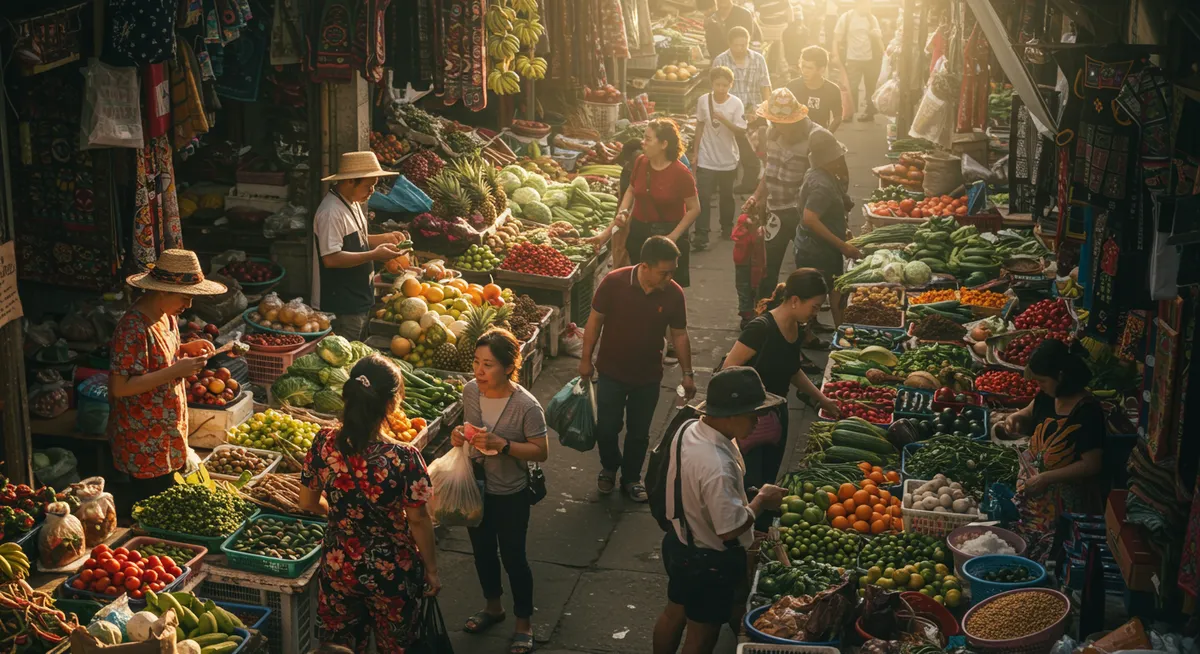
Tech and Connectivity Hacks
Staying connected while traveling has become essential for navigation, translation, and sharing experiences. These tech hacks will help you maintain connectivity without incurring excessive costs or compromising your data security. Discover more advanced connectivity solutions in our comprehensive article on tech and connectivity travel hacks.
31. Download Offline Maps Before Arrival
Before arriving at your destination, download offline maps through Google Maps or apps like Maps.me. This allows you to navigate without using data or requiring Wi-Fi connection. You can save specific areas, mark points of interest, and even get directions while completely offline, saving both data usage and battery life.
32. Use a Travel-Friendly SIM Card or eSIM
Instead of paying expensive roaming charges from your home provider, purchase a local SIM card at your destination or use an international eSIM service. Many companies now offer prepaid international data packages or eSIMs that can be activated before you travel, providing data access at a fraction of standard roaming costs.
33. Leverage Free Wi-Fi Strategically
Plan your digital activities around free Wi-Fi access points. Many cities offer free public Wi-Fi in parks, libraries, and public spaces. Additionally, cafes, restaurants, and museums often provide complimentary Wi-Fi to patrons. Use these opportunities to update maps, check messages, or upload photos rather than consuming mobile data.
34. Bring a Portable Battery Pack
A reliable portable charger prevents the stress of a dying phone when you need it most for navigation, translation, or emergency communication. Invest in a high-capacity power bank that can charge your devices multiple times. For longer trips, consider a model with solar charging capabilities for sustainable power.
35. Use Travel-Specific Apps
Beyond the basics, specialized travel apps can enhance your journey. Apps like Google Lens for instant translations of signs and menus, XE Currency for real-time exchange rates, or TripIt for organizing all your bookings in one place can streamline your travel experience and solve common challenges on the go.
Pro Tip: Enable offline access for entertainment before your journey. Download movies, podcasts, e-books, or music playlists to enjoy during long flights or train rides without relying on spotty in-transit Wi-Fi or using precious data.
36. Create Digital Backups
Use secure cloud storage services to keep digital copies of your travel documents, including passport, visa, travel insurance, and booking confirmations. Services like Google Drive, Dropbox, or dedicated travel apps allow you to access these critical documents even if your physical copies or devices are lost or stolen.
37. Set Up a Travel Notice for Digital Services
Many digital services have security features that may flag login attempts from new countries as suspicious. Before traveling, set up travel notices with your email provider, banking apps, and other critical digital services to prevent being locked out of your accounts when accessing them from your destination.
38. Use a Universal Travel Adapter with USB Ports
Rather than carrying multiple adapters for different regions, invest in a universal travel adapter that works worldwide and includes USB charging ports. This all-in-one solution allows you to charge multiple devices simultaneously while only occupying one wall outlet, which is especially valuable in older hotels with limited plugs.
39. Take Advantage of Digital Entertainment Libraries
Long journeys and unexpected delays become more bearable with entertainment. Services like Netflix, Amazon Prime, and various e-book platforms allow you to download content for offline viewing. Prepare a library of movies, shows, books, or games before your trip to stay entertained without requiring internet access.
40. Keep Technology Safe and Accessible
Organize your tech gear with a dedicated pouch or organizer that keeps cables, adapters, memory cards, and small electronics neatly arranged and protected. Keeping these items together not only prevents damage but also ensures you can quickly find what you need without digging through your entire bag.
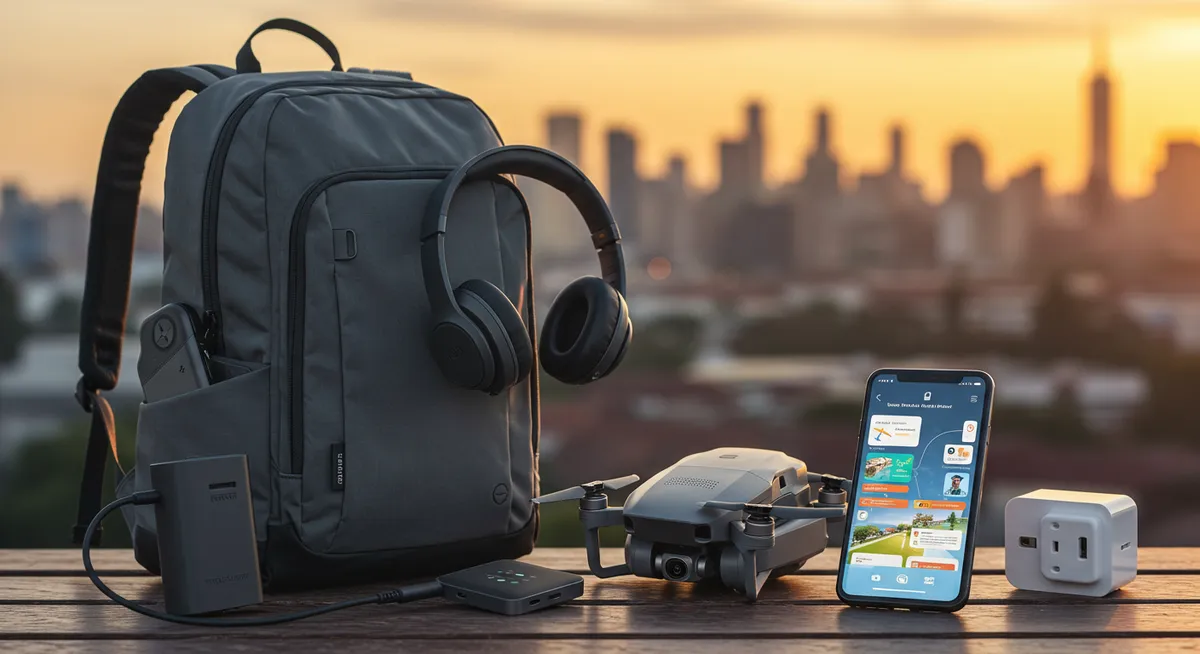
Health and Comfort Hacks
Maintaining your health and comfort while traveling is crucial for enjoying your adventure to the fullest. These practical hacks will help you stay well, manage minor ailments, and adapt to new environments with minimal disruption. For more detailed wellness advice for travelers, don't miss our complete guide to health and comfort while traveling.
41. Create a Compact Travel First Aid Kit
Assemble a small, personalized first aid kit with essentials like pain relievers, band-aids, anti-diarrheal medication, antihistamines, and any personal medications. Include travel-sized items like rehydration sachets and antiseptic wipes. This preparation allows you to address minor health issues immediately without searching for a pharmacy in an unfamiliar place.
42. Stay Hydrated During Flights
Combat the dehydrating effects of airplane cabins by drinking plenty of water before, during, and after your flight. Carry an empty reusable water bottle through security and fill it once you're past the checkpoint. Limit alcohol and caffeine during flights, as these can worsen dehydration and disrupt your sleep cycle.
43. Use Compression Socks for Long Journeys
Prevent swollen ankles and reduce the risk of deep vein thrombosis on long flights or bus journeys by wearing compression socks. These specially designed socks improve circulation in your lower legs when sitting for extended periods and can significantly increase your comfort during and after long-haul travel.
44. Pack Essential Oils for Multiple Uses
A small bottle of essential oil like lavender or peppermint serves multiple purposes: use lavender to help with sleep in unfamiliar environments, peppermint to alleviate nausea or headaches, and either as a natural insect repellent or room freshener. Just a few drops can transform your comfort level in various situations.
45. Adapt to New Time Zones Strategically
Combat jet lag by adjusting your schedule to your destination's time zone as soon as possible. Upon boarding your flight, set your watch to your destination's time and begin eating and sleeping according to that schedule. Upon arrival, try to stay awake until a normal local bedtime, and spend time outdoors during daylight hours to help your body clock adjust faster.
Pro Tip: Earplugs and an eye mask are lightweight essentials that dramatically improve sleep quality in noisy hotels, overnight transportation, or when sharing accommodations with others. Silicone earplugs mold to your ear shape for better noise blocking than foam alternatives.
46. Prevent Blisters with Paper Surgical Tape
Before a day of extensive walking, apply paper surgical tape to areas prone to blisters, such as heels and toes. This inexpensive solution creates a protective barrier that prevents friction and resulting blisters. Unlike bandages, the tape stays in place even with moisture and doesn't bunch up inside your shoes.
47. Use a Clothesline for Quick Laundry
Pack a lightweight, portable clothesline with built-in clips to wash small items in your accommodation's sink. This allows you to refresh essentials without paying for laundry service or spending time at a laundromat. Quick-drying fabrics will be ready to wear again by morning, extending your wardrobe during longer trips.
48. Bring Rehydration Solutions
Electrolyte powders or tablets that dissolve in water help maintain hydration during active days, in hot climates, or when experiencing stomach issues that can lead to dehydration. These lightweight additions to your kit can prevent more serious health complications and help you recover quickly from minor illnesses.
49. Carry a Compact Travel Pillow
Invest in a high-quality, packable travel pillow for better rest during transit. Modern designs include inflatable options that pack down to pocket size, memory foam pillows that compress into small pouches, or scarf-style pillows that provide neck support while doubling as a fashion accessory.
50. Protect Your Skin in Multiple Climates
Regardless of your destination, pack a broad-spectrum sunscreen and moisturizer. Air travel, climate changes, and increased sun exposure can rapidly affect your skin. A combination sunscreen/moisturizer saves space while providing essential protection against both immediate sunburn and long-term skin damage.
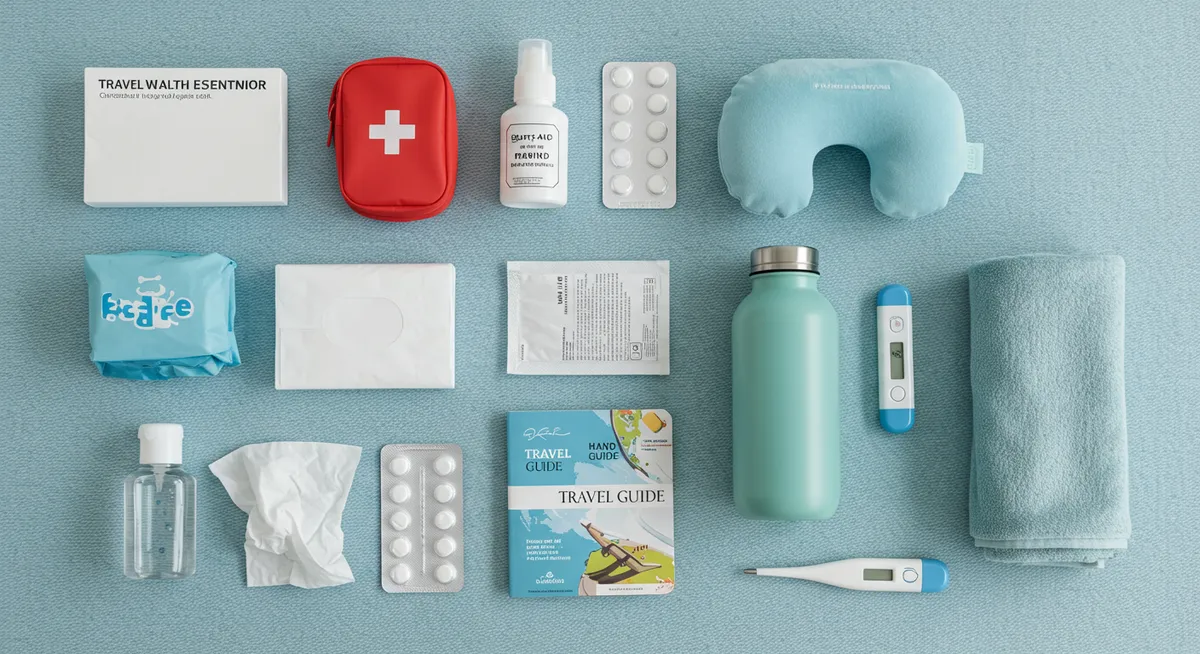
Enhance Your Travel with Our Top-Rated Strategies
While the 50 travel hacks shared in this guide will significantly improve your travel experiences, we've also developed more comprehensive strategies for those looking to truly master the art of travel. Our Top-Rated Travel Strategies guide features six exceptional techniques that savvy travelers consistently rely on for dramatic improvements in their journeys:
- 24-Hour Flight Price Lock Strategy - Save up to $300 on airfare using this little-known booking technique
- Hotel Room Upgrade Email Template - Secure free hotel upgrades worth $50-150 per night with this proven approach
- AI Flight Price Prediction Tool Strategy - Use artificial intelligence to save an average of 23% on flight bookings
- 3-2-1 Packing Cube System - Transform your luggage organization to increase space by 42% and eliminate wrinkles
- Travel Credit Card Points Strategy - Fund luxury travel experiences worth thousands through strategic credit card usage
- Hidden Destination Alternative Finder - Discover remarkable substitutes for popular tourist destinations, saving up to 45% while enjoying more authentic experiences
Travel Hack Categories for Deeper Exploration
To further enhance specific aspects of your travel experience, explore our specialized travel hack collections:
- Planning and Booking Hacks - Master the pre-departure phase with strategies for securing the best deals
- Packing Hacks - Transform your luggage organization with space-saving techniques
- Money-Saving Hacks - Stretch your travel budget further with practical cost-cutting strategies
- Tech and Connectivity Hacks - Stay connected and leverage technology effectively while traveling
- Health and Comfort Hacks - Maintain your wellbeing and comfort throughout your journey
- Flight Hacks - Maximize comfort and minimize costs for your air travel experiences
- Accommodation Hacks - Secure better lodging for less with these insider techniques
- Airport Hacks - Navigate terminals like a pro and make the most of your time in airports
Conclusion: The Path to Travel Mastery
Travel should be a journey of discovery and joy, not a source of stress or financial strain. By incorporating these travel hacks into your planning and execution, you'll transform how you experience the world. Start with the strategies that address your most significant travel pain points, then gradually expand your repertoire as you gain confidence.
Remember that the most successful travelers aren't those who spend the most money, but those who apply knowledge, planning, and creativity to craft more rewarding experiences. Each trip becomes an opportunity to refine your approach and discover new techniques that enhance your personal travel style.
Whether you're embarking on a weekend getaway or planning the trip of a lifetime, these 50 travel hacks—combined with our Top-Rated Travel Strategies—will help you travel smarter, spend less, and create more meaningful memories along the way. The world is waiting to be explored, and now you have the tools to do it better than ever before.
Safe travels!
Frequently Asked Questions About Travel Hacks
What are the most important travel hacks for first-time international travelers?
First-time international travelers should prioritize these essential travel hacks: create digital and physical copies of all important documents (passport, visa, insurance), notify your bank and credit card companies about travel dates and destinations, use credit cards with no foreign transaction fees to avoid unnecessary charges, download offline maps through Google Maps or Maps.me, install translation apps like Google Translate with offline language packs, and research local customs and basic phrases before arrival. These preparations ensure smoother travel experiences and help avoid common pitfalls when visiting foreign countries.
Which travel hacks save the most money on international and domestic trips?
The most effective money-saving travel hacks include: planning trips during shoulder season (between peak and off-peak) for 20-50% savings on accommodations and attractions, using browser incognito mode when searching for flights to prevent price inflation based on search history, setting fare alerts on platforms like Skyscanner or Google Flights, dining where locals eat rather than at tourist hotspots (typically 30-40% cheaper), purchasing city transportation passes for unlimited rides instead of individual tickets, booking accommodations with kitchen facilities to prepare some meals yourself, and using cashback or travel reward credit cards for all pre-trip purchases. These strategies can collectively save travelers hundreds or even thousands of dollars on a single trip.
What are the best packing hacks to save space and travel lighter?
To maximize luggage space and travel lighter, implement these proven packing hacks: roll clothes tightly instead of folding them (saves up to 30% space), use compression packing cubes to organize and compact clothing by category, pack versatile clothing items that can be layered and mixed for multiple outfits, utilize the "5-4-3-2-1" rule for week-long trips (5 pairs of socks/underwear, 4 tops, 3 bottoms, 2 pairs of shoes, 1 jacket), stuff socks and small accessories inside shoes to utilize empty spaces, wear your bulkiest items (jackets, boots) during transit, pack travel-sized toiletries or solid alternatives (shampoo bars, solid perfumes), and choose lightweight, quick-dry fabrics that can be washed and reworn during your trip. These techniques can help you pack everything in a carry-on, even for extended trips.
How can I stay connected abroad without spending a fortune on roaming charges?
To maintain affordable connectivity while traveling internationally: purchase local SIM cards upon arrival or order destination-specific eSIMs before departure (typically 70-90% cheaper than roaming), download Google Maps offline for your destination areas before traveling, pre-download entertainment content on Netflix, Spotify, or Kindle for offline access, use messaging apps like WhatsApp or Signal that work over WiFi, identify free WiFi hotspots at cafes, libraries, and public spaces using apps like WiFi Map, invest in a portable battery pack with at least 10,000mAh capacity for all-day charging, consider portable WiFi devices for family travel, and use VPN services when connecting to public networks for security. These strategies ensure you stay connected without returning home to shocking phone bills.
What health hacks should I consider for long-haul flights and jet lag prevention?
For healthier long-haul flights and reduced jet lag: stay properly hydrated by drinking 8oz of water for every hour in the air, wear graduated compression socks (15-20 mmHg) to prevent swelling and reduce DVT risk, perform in-seat exercises and walk the cabin aisle every 1-2 hours to maintain circulation, use a supportive travel pillow and eye mask for better quality sleep, adjust your watch to your destination time zone immediately upon boarding, avoid alcohol and caffeine which disrupt sleep patterns and worsen dehydration, use melatonin supplements strategically to reset your body clock (consult your doctor first), expose yourself to natural daylight upon arrival to help reset your circadian rhythm, and consider fasting or following the "Argonne diet" protocol before travel to minimize jet lag effects. These evidence-based approaches can significantly improve your recovery time and overall travel experience.
Which travel hacks work best for family travel with children of different ages?
Families traveling with children benefit most from these specialized travel hacks: book accommodations with kitchen facilities and separate sleeping areas through platforms like Airbnb or apartment hotels, prepare a comprehensive family first aid kit including children's medications and band-aids with favorite characters, download age-appropriate entertainment, games and educational content before departure (including offline access), pack snacks in individual containers to prevent meltdowns during transit delays, bring collapsible water bottles for each family member to stay hydrated without bulk, use color-coded packing cubes to organize each person's belongings for easy identification, pack a small "surprise bag" with new toys/activities to reveal during long waits, book flights during children's regular sleep times when possible, and research family-friendly activities and restaurants at your destination in advance. These strategies help maintain routines while traveling and minimize stress for parents and children alike.
We hope these 50 travel hacks enhance your journeys and help you create unforgettable experiences without breaking the bank. Remember that the best travelers are those who adapt these strategies to fit their unique style and preferences. As you implement these hacks, you'll develop your own variations that work perfectly for your travel needs.
Explore Our Travel Strategy Collection
Looking to take your travel optimization to the next level? Explore our detailed strategy guides that dive deeper into specific travel techniques:
Top-Rated Strategy Guides
Travel Category Guides
Specialized Travel Resources
Related Posts

Hidden Destination Alternative Finder: Discover Affordable Luxury Travel Gems
Master the Hidden Destination Alternative strategy to find spectacular yet affordable substitutes for popular tourist destinations, saving up to 45% on travel costs while enjoying more authentic experiences.
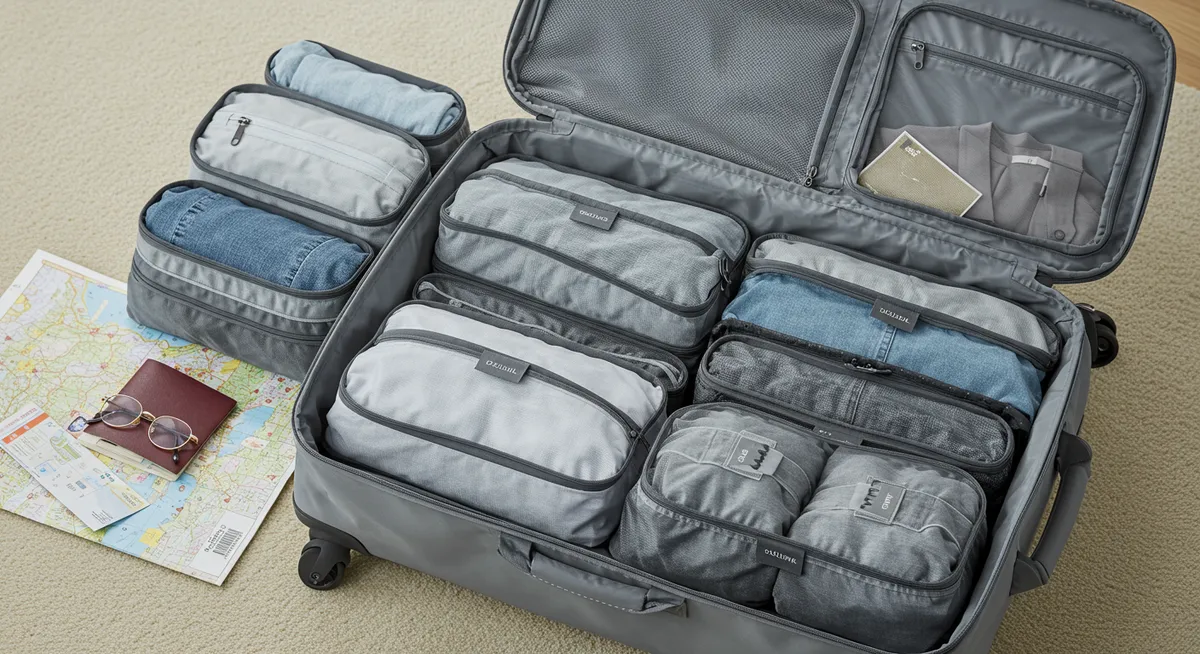
3-2-1 Packing Cube System: The Ultimate Method for Efficient Travel
Master the revolutionary 3-2-1 Packing Cube System that maximizes luggage space by 42%, eliminates wrinkles, and ensures perfectly organized travel belongings.
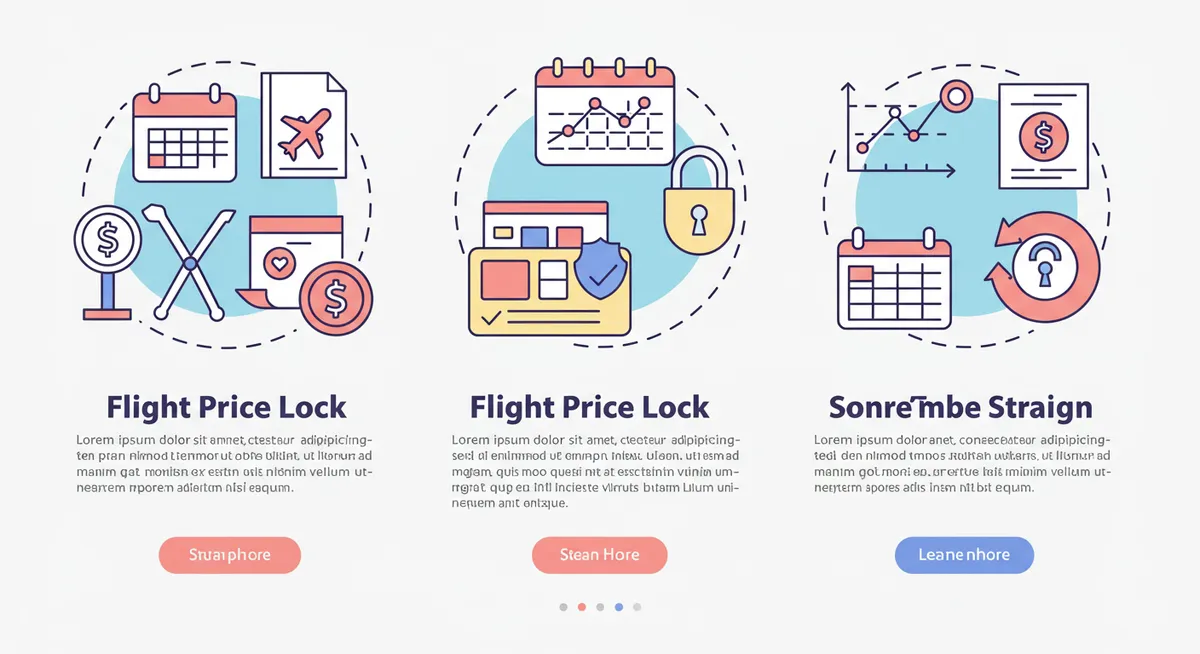
24-Hour Flight Price Lock Strategy: How to Save Hundreds on Airfare
Learn how to use the little-known 24-hour flight price lock rule to secure the best possible airfares and save up to $300 on your next booking.